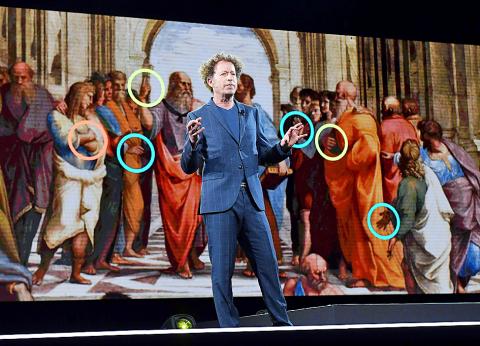Amazon.com Inc chief executive officer Jeff Bezos on Thursday said he expects there to be commercial robots in the next 10 years that can grasp items as reliably as humans, a development that could lead to the automation of warehouse jobs around the world.
The remark, made on stage at Amazon’s “re:MARS” conference in Las Vegas, underscored how companies and university researchers are rapidly developing technology to perform human tasks, whether for elder care in the home or for the picking and stowing of goods in retail warehouses.
“I think grasping is going to be a solved problem in the next 10 years,” he said. “It’s turned out to be an incredibly difficult problem, probably in part because we’re starting to solve it with machine vision, so [that means] machine vision did have to come first.”

Photo: AFP
Bezos did not discuss any Amazon deployments of the technology, which it has tested from the Boston-area start-up Soft Robotics, for instance, a person familiar with the matter said previously.
The company has said that it views automation as a way to help workers.
Still, Amazon is known for its drive to mechanize as many parts of its business as possible, whether pricing goods or transporting items in its warehouses. It employs hundreds of thousands of people, many of whose primary task is grasping, scanning and placing customer orders.
A variety of companies other than Amazon have also rolled out robotic hands for limited warehouse pilots.
In the on-stage interview, Bezos also discussed Project Kuiper, Amazon’s recent bet to launch thousands of satellites to expand broadband Internet access, which he said was “close to being a fundamental human need.”
“It’s also very good business for Amazon because it’s [a] very high capex undertaking; it’s multiple billions of dollars of capex,” he said. “Amazon is a large enough company now that we need to do things that if they work can actually move the needle.”
Asked whether people ever say “no” to Bezos, the world’s richest person and a famously scrupulous boss, he joked, “No! Certainly not twice. No, seriously, I do get told ‘no’ all the time. I seek it out.”
“People who are right a lot, they listen a lot. They also change their mind a lot,” he said earlier in the interview. “They wake up, and they re-analyze things all the time.”

Merida Industry Co (美利達) has seen signs of recovery in the US and European markets this year, as customers are gradually depleting their inventories, the bicycle maker told shareholders yesterday. Given robust growth in new orders at its Taiwanese factory, coupled with its subsidiaries’ improving performance, Merida said it remains confident about the bicycle market’s prospects and expects steady growth in its core business this year. CAUTION ON CHINA However, the company must handle the Chinese market with great caution, as sales of road bikes there have declined significantly, affecting its revenue and profitability, Merida said in a statement, adding that it would

RISING: Strong exports, and life insurance companies’ efforts to manage currency risks indicates the NT dollar would eventually pass the 29 level, an expert said The New Taiwan dollar yesterday rallied to its strongest in three years amid inflows to the nation’s stock market and broad-based weakness in the US dollar. Exporter sales of the US currency and a repatriation of funds from local asset managers also played a role, said two traders, who asked not to be identified as they were not authorized to speak publicly. State-owned banks were seen buying the greenback yesterday, but only at a moderate scale, the traders said. The local currency gained 0.77 percent, outperforming almost all of its Asian peers, to close at NT$29.165 per US dollar in Taipei trading yesterday. The

RECORD LOW: Global firms’ increased inventories, tariff disputes not yet impacting Taiwan and new graduates not yet entering the market contributed to the decrease Taiwan’s unemployment rate last month dropped to 3.3 percent, the lowest for the month in 25 years, as strong exports and resilient domestic demand boosted hiring across various sectors, the Directorate-General of Budget, Accounting and Statistics (DGBAS) said yesterday. After seasonal adjustments, the jobless rate eased to 3.34 percent, the best performance in 24 years, suggesting a stable labor market, although a mild increase is expected with the graduation season from this month through August, the statistics agency said. “Potential shocks from tariff disputes between the US and China have yet to affect Taiwan’s job market,” Census Department Deputy Director Tan Wen-ling

UNCERTAINTIES: The world’s biggest chip packager and tester is closely monitoring the US’ tariff policy before making any capacity adjustments, a company official said ASE Technology Holding Inc (日月光投控), the world’s biggest chip packager and tester, yesterday said it is cautiously evaluating new advanced packaging capacity expansion in the US in response to customers’ requests amid uncertainties about the US’ tariff policy. Compared with its semiconductor peers, ASE has been relatively prudent about building new capacity in the US. However, the company is adjusting its global manufacturing footprint expansion after US President Donald Trump announced “reciprocal” tariffs in April, and new import duties targeting semiconductors and other items that are vital to national security. ASE subsidiary Siliconware Precision Industries Co (SPIL, 矽品精密) is participating in Nvidia